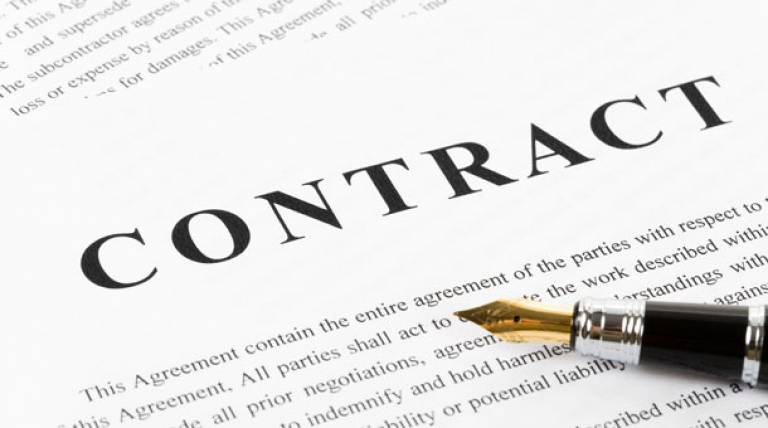Missing this could cost you a lot of money, big clients and many years full of nerve-wrecking legal disputes. So hold on…
More lawyers in the UK like you are signing legal documents where mistranslations can easily be overlooked and can put your company in jeopardy. But why? Because identifying these translation mistakes can be difficult and correcting these even more. Now, see for yourself what kind of risks might be lurking inside your legal documents.
1. What is a contract and what to look for in a contract translation
A contract forms the legal foundation between the signing parties.
But an agreement is not a contract when important terms are not determined. Not only is it regarded as fundamental to have certainty about the contractual terms within a contract, but these terms must also be crystal clear, understandable and obvious to the parties. To encounter uncertainties in this regard as well as the need for further agreements between the parties renders the agreement unenforceable. If the terms are expressed in an uncertain or vague manner, the court will classify the contract as simply non-existent.
Specialist legal translators ensure that the meaning behind the documents is transferred accurately. There must be no deviation from the original text and no interpretation when it comes to the translation of legal documents, in particular contracts, because it may result in loopholes and could change the meaning of the contract. Clearly, patience and attention to detail are core elements to guarantee your contract translation represents the original text.

2. Take a look at contract law in the UK
In the UK, contract law is primarily based on case law.
This means previous case decisions ruled by the British courts apply. The four key stages that parties in the process of forming a legal relationship undergo are negotiation, formation, modification and termination. A contract is often preceded by a long period of negotiation between the parties which is especially true between parties who have equal bargaining power. If the negotiations run smoothly, a contract can be created and hence forming the basis of conducting business between the parties.
It is a common misconception to think that a contract can only be formed in writing. Under UK contract law, both a formal and informal contract is possible. A formal contract has been formed when parties sign a document. An informal contract is present when the parties have created an oral agreement.
It is advisable to read and re-read the contents of the contract to get a thorough understanding of the matter at hand because contract law can be complex and difficult to understand. In the event something might seem unclear, seek and obtain clarification by consulting a specialist lawyer who specialises in contract law. To guarantee you sign a legally enforceable contract, look out for the following criteria: First, make sure the agreement is complete and that the terms of the contract are clear and not vague. Also, ensure there is no need to further develop or clarify the contractual terms and contents within the frame of the contract.
3. What is the meaning of a contract signature
Every time you leave your signature on a piece of paper, you as the signee, express your agreement to comply with the outlined terms and contractual obligations within the frame of this contract. Many legal professionals claim to protect the rights and interests of all parties by having everything in writing. In this sense, you as the signee confirm that the contract has been read and understood. Hence, you have expressed your consent to the subject matter of the contract as well as your intent to enter into a contract with the signing parties. The act of signing a document in itself implies that you are legally authorised to do so. Having said that, in some instances you might be well-advised not to sign at all such as when you find unfilled blanks within the contract, find yourself being under duress, or simply have the need for further clarification. By asking your lawyer to explain unknown or ambiguous terminology, you can easily get rid of confusion and get a good understanding of the relevant contents.
4. How contract translations can be affected by different systems
To realise that different countries come along with different legal systems is only the first step. Because depending on the location where the contracts were drafted, the legal meaning may differ. If you get your documents examined by a lawyer who specialises in contract law and contract drafting, then you can be sure your legal documents are enforceable by law. To guarantee you receive a contract translation that is both legally and linguistically secure and accurate, it is advisable to have your documents translated by a specialist legal translator so you can invest your hard-earned money wisely.
Translation of legal terminology
In my experience, a solid understanding of the legal systems as well as knowledge in terms of how the legal terminology can be correctly applied is indispensible. This is why specialist translators invest a lot of time and money in continuous professional development. By doing so, we can guarantee that your texts are thoroughly translated and hence leave no room for ambiguity or misinterpretation. Oftentimes, language barriers emerge when doing business with international clients but there is simply no room left for vagueness because clarity and legal certainty are vital to secure the trust of your clients.
When reviewing a contract,
you may encounter words, expressions and terms that do not allow a literal translation because there may be no literal equivalent. Translating these expressions might constitute a challenge for generalist translators. Why? Because translating these wordings without changing the meaning of the terms can be a difficult task to perform when there is no literal equivalent or no equivalent at all. While countries such as Australia, Ireland, most parts of the United Kingdom, the United States (except Louisiana) and more countries are governed by common law, countries such as Germany, Austria, Switzerland and more are ruled by civil law.
So, the difference in meaning may be relevant when taking a look at the legal terminology and expressions of the two legal systems. The fact that the meaning can be altered may be relevant for the contractual parties who have to make a well-informed decision as to whether or not they want to sign because doing so means expressing their agreement. Now, you have learned that legal terms may be interpreted differently depending on the context and the legal system. Another aspect to consider is that a legal term may be common in one specific legal system, but it may have a different meaning in another country. Sometimes translators come across legal terms that can only be found in a certain country. Oftentimes, these terms cannot be translated and one may have to come up with an appropriate description or do some research to find out whether a similar term might exist.
Conditions und warranties
A condition stipulates the terms, obligations and provisions under which the signing parties form an agreement. When a party does not comply with the conditions, then the other party is entitled to terminate the contract. A warranty is a written guarantee given by the service provider or manufacturer with regard to its performance and may only be valid for a certain period. While the breach of a condition allows the receiving party to withdraw from the contract, the same is not true for a warranty. And in some cases, such as not complying with a condition, the buyer can decide as to whether to withdraw from a contract or to claim damages while classifying it as a warranty.
On behalf of
Some expression such as “on behalf of” have to be treated with special care because it could cause some major problems if neglected. Imagine you sign a contract while representing a colleague of your company but you did not put the expression “on behalf of” before your signature. To avoid being personally liable for potential lawsuits that could arise within the frame of the contract, always include this expression so that it becomes obvious as a reference point later on. Also, it is worthwhile mentioning that the correct person, this means only someone who is legally authorised and mentally capable of forming a binding contract, is allowed to sign it.
5. The dangers of a poor translation
Turning a blind eye to translation mistakes doesn’t come without consequences. It is definitely a risk too high to take as well as a price too high to pay. Why? Because the translated documents pave your way for (hopefully) giving good and correct legal advice to your clients.
Confusion, uncertainty and misinterpretation. Often the result of a poor translation – it is likely to make the overall communication with your clients suffer because the wrong conclusions can be drawn by the parties. The resulting misinterpretation may significantly slow down the negotiation process because it has to be figured out where the mistakes lie first. Experienced translators can instantly tell when something does not sound correct. Now, imagine someone who is not legally authorised signs or approves the contract by mistake. Then an important deadline or obligation could no longer be met and you probably know best how this may affect your business.
A poorly translated contract could cost you future business opportunities. Your already existing business relationships could be undermined by loss of confidence resulting in a drop in revenue. This could constitute a serious threat to your ability to attract new clients and to ensure your clients remain loyal. So, make sure you don’t miss out on valuable business deals by choosing a specialist legal translator. By doing so, your clients will be thankful, feel well taken care of and you will be rewarded in many different ways for many years to come due to your good judgement.



